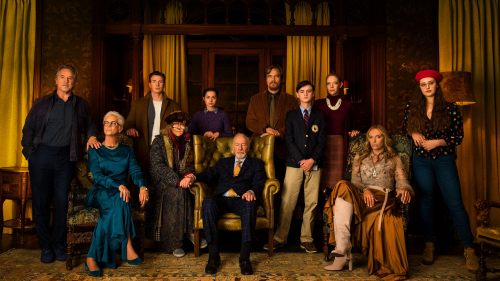INSIDE LLEWYN DAVIS Review: Assured, Minimalist Filmmaking
If you’re familiar at all with the work of the Coen brothers, everything about Inside Llewyn Davis will feel familiar. It’s effective, efficient and masterful filmmaking, something we’ve come to expect from the Coens. Not a scene, minute or moment is wasted and just when you think you have a handle on where it’s going it swerves and weaves to new and beautiful places. It belongs near the very top of their best films.
The visual sense of Llewyn Davis is reminiscent of the soft look of O Brother Where Art Thou? even though this time out cinematographer Bruno Delbonnel pinch hits for Coen regular Roger Deakins. That film was accented by a dominant golden hue that emphasized its romantic and mythical tale of the Odyssey via a 1930s American South prison escape. Davis is overtaken by muted grey tones that mirror the film’s NYC winter setting. Both films are a loving ode to their time periods, but Davis is decidedly more bleak and complicated. It’s set in the 1960s Greenwich Village folk scene and, like O Brother, the film is imbued with a wonderful soundtrack produced by T-Bone Burnett.
The star of the film (and soundtrack) is Oscar Isaac. He plays the titular Llewyn, a poor, nomadic folk musician who spends his time playing a few gigs, arguing with his manager and jumping from couch to couch. From the start the film makes sure we know he’s selfish, yet charismatic. At first you can’t see how anyone would let him crash at their place, let alone talk to him. After a while you don’t mind, and even enjoy, spending a whole movie with him. That’s a testament to Isaac, who was gift wrapped an amazing opportunity and nails it.
The story takes place over a week in the Llewyn’s life. During these few days he loses a friend’s cat, learns that he may have impregnated his married friend (a wonderful, sassy Carey Mulligan), takes a trip to Chicago and plays some music. It’s a deceptively simple story that is brilliantly tied together by the film’s amazing soundtrack, which includes live, onscreen performances from Isaac and other actors including Justin Timberlake, Mulligan and Adam Driver, as well as the acting chops of its impressive cast.
John Goodman steals all his scenes as a jazz musician that Llewyn accompanies on that trip to Chicago. Mulligan keeps giving great performance after great performance in a fiery turn as Llewyn’s friend and sometimes lover. Timberlake is great as her happy, wide-eyed husband. Even F. Murray Abraham gets called up to anchor one of the movie’s very best scenes.
It’s their simple approach, at least plot-wise (Joel Coen has already been quoted as saying “the film doesn't really have a plot. That concerned us at one point; that's why we threw the cat in”), that allows the Coens to work their magic. Instead of being tied down by story points the Coens allow character, tone and theme to take center stage.
These focuses move away from most of their plot-driven and plot-heavy works and are most closely aligned to their recent masterpiece, A Serious Man. Like that film, Davis slowly shows you its hand, revealing bits one at a time about Llewyn, revelations both big and small I won’t spoil here, until you realize exactly what journey Llewyn has gone on. By the end there’s a wonderful sense of satisfaction that seemed almost impossible just five minutes prior.
There’s also the Coens’ take on the folk scene. What exactly does the fictional Llewyn represent about it? Did they just use it as an excuse to have over a dozen folk songs in a movie? And what’s with the cats? Again, like A Serious Man, the answers aren’t cut and dry. There are pieces, clues and ideas everywhere, but this is a film that will no doubt reward multiple viewings.
Inside Llewyn Davis is an example of amazingly understated storytelling, the kind of stuff only writers with the Coens’ pedigree could pull off. In the wrong hands the film’s subtle, minimalist approach would come off as boring, meandering and unfocused. Instead is as assured and confident as any film you’ll see this or any year.



